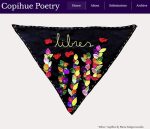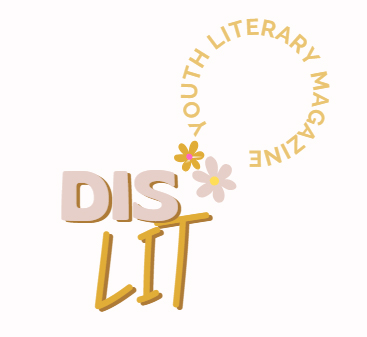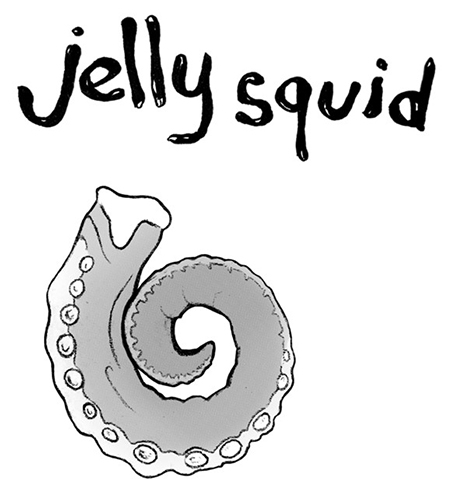New Lit on the Block :: Copihue Poetry

Copihue Poetry is a new, open-access online journal of poetry and poetry in translation published twice each year in the winter and summer. “One of our main goals,” Poetry and Translation Editor David M. Brunson says, “is to be accessible to poets and translators at all stages of their careers. In our first issue, we published some very established names alongside those who had their first publication in our pages.”
This is in keeping with the publication’s mission statement, “We seek to publish exciting new work that moves beyond the imaginary borders of language, state, and culture. As a multilingual journal, we present poetry written in English, poetry written in Spanish, and poetry translated into English alongside the original language. It is our goal to highlight a mixture of poets and translators, both emerging and established. We are especially interested in writers who have been underrecognized or previously unrecognized in English translation, as well as writers of identities historically marginalized by the literary world.”
“While the poetry we publish doesn’t have to be explicitly international in its focus,” Brunson says, “we are interested in work that examines place, language, and culture, especially work that exists in between structures both real and imaginary.”
The publication’s name come from the copihue, or lapageria rosea: the national flower of Chile. Brunson explains, “It’s endemic to the Valdivian temperate rainforests in the south of Chile and is unique in that it’s the only one of its genus and species. As one of our goals as a magazine is to put contemporary Chilean poetry in conversation with global poetry, our name represents the uniqueness of Chile’s literary ecosystem, as well as being emblematic of our new home.”

While the homescape may be new, the editors of Copihue Poetry are themselves well-established and experienced in the literary landscape. Brunson earned an MFA in Poetry and Literary Translation from the University of Arkansas and has been widely published. He is also the editor and translator of A Scar Where Goodbyes Are Written: An Anthology of Venezuelan Poets in Chile, (LSU Press, 2023). He currently lives in Santiago, Chile, where he works as an English teacher. Joining him is Poesía en español Editor Ivana Aponte who holds a Literature degree from the Universidad Católica Andrés Bello in Caracas, Venezuela, and a Master’s degree in literature from the University of Chile. She has numerous publication credits for individual works, and her first poetry collection, Afectos, was published by LP5 Editora in April 2022. Since 2017, she has lived in Santiago, Chile, where she works as a Spanish teacher. Rounding out the masthead is Assistant Poetry Editor Peter Mason, a Bi+ poet and literary event, program, and development specialist from Rochester, NY, living in the Twin Cities area. He earned an MFA from the University of Arkansas and served as Development Director for the Open Mouth Literary Center. Currently, he is the Assistant Director of the MFA Program in Creative Writing at the University of Minnesota.

The motivation for starting a literary publication can be varied, but generally seeded by something personal, as Brunson shares, “Before Copihue, I was the translations editor at the Arkansas International. By reading subs and publishing the best that came our way, I was introduced to the work of many great poets from around the world that I may not have encountered otherwise. When I graduated from the Arkansas MFA, my time with Ark Int came to a close. Throughout the next year, I felt like there was a hole in my literary life. I was still reading, writing, and translating, but I was no longer publishing the work of others. Copihue came along as a way to continue contributing to the broader literary community by publishing exciting new poetry that creates dialogue between the English-speaking world, the Spanish-speaking world, and the world at large through translated literature. When I ran the idea by Ivana, she was immediately on board, and Copihue was born.”
“The whole process is very rewarding,” Brunson adds. “It’s always a thrill to find new, deeply moving poetry and present it to the world for the first time. Reading submissions is such a different, yet equally rewarding process as reading books and previously published poetry. It’s something we all truly enjoy.”

For writers looking to be a part of that rewarding publishing experience, Brunson explains their submissions process, “One of our goals as a magazine is to keep things free or as close to free as possible, and for that reason, we’ve decided to accept our submissions via email to avoid Submittable fees. Most magazines and presses in the Chilean/Latin American literary world don’t charge authors to submit their work. I know from personal experience that submission fees can very quickly add up, so we’ve decided to prioritize keeping everything as financially accessible as possible to potential contributors. To this end, as in international literary mag, we also need to recognize the different realities of the writers we represent. That one-time $3 fee might not be too bad in the United States, but in Chile and elsewhere in Latin America, $3 might be an hour’s minimum wage or more, which would be exclusionary towards our Spanish-language writers.
“As for our reading process, Ivana does the first read-through of all the Spanish-language submissions. I also read through all the Spanish-language submissions as a second reader, but Ivana is always the one to make the final call. I’m the first to read through every English-language submission, during which I go ahead and reject pieces that aren’t a good fit. The pieces that do make it through the first round typically go to Pete and Ivana, and we’ll often discuss them as a team to make final decisions. I’m also the first to read translations, but Ivana will also typically give a second opinion. We receive fewer translations than any other subgenre, so if I think a piece is good, I’ll often jump on it before it gets accepted elsewhere.
“As for feedback, we’ll sometimes give editorial feedback for accepted pieces–especially translations. These are usually just minor suggestions to polish the final piece, and they don’t have any bearing on whether we decide to accept a poem. If we accept it, it’s because we love it! We generally don’t provide feedback on rejected pieces, but like all magazines, we get a lot of great work that we just don’t have space to publish, and/or great pieces that don’t quite fit with the vision of the journal. As writers ourselves, we always appreciate a personal rejection, so we do try to send a higher-than-average number of personal rejections—and often ask to see more work during future reading periods.
“Our response time can vary and is probably closer to 1-1.5 months at the moment. We do strive to maintain a quick turnaround, so we don’t imagine it ever taking more than about 2 months for a response.”
For readers looking to visit Copihue Poetry, Brunson says, “They can expect to find a mixture of poetry in English, poetry in Spanish, and poetry in translation alongside the original language. There’s no single style that we’re drawn toward, so readers should expect to find a diverse mix of styles and voices from a wide range of countries and regions.”
Some recent contributors include H. S. Shivaprakash, Alina Stefanescu, Jose Hernandez Diaz, Estelle Coppolani, Álvaro Calfucoy Gutiérrez, Mohja Kahf, and Blanca Wiethüchter.
Going forward, Brunson says, “Since we only have one issue under our belt, our only concrete goal is to continue reading submissions, publishing high-quality poetry, and growing our readership. We’re a three-person team with no external funding, so there are days and weeks where we need to grind through the production—especially when it comes time to build the web page for the issue. It’s all worth it though. If things go smoothly for the next few years (and if we can acquire a source of external funding), we may branch out into a press that publishes print editions of poetry in translation. We’ll see where the future takes us.”
Brunson adds this last shout out, “Translators—send us your most exciting work! If it’s good, we’ll accept it. Because we receive substantially fewer translation submissions, our translations reading period is always open.”




